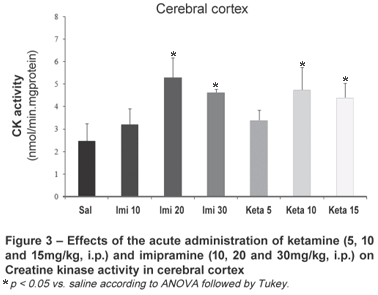OBJECTIVE: Clinical findings suggest that ketamine may be used for the treatment of major depression. The present study aimed to compare behavioral effects and brain Creatine kinase activity in specific brain regions after administration of ketamine and imipramine in rats. METHOD: Rats were acutely given ketamine or imipramine and antidepressant-like activity was assessed by the forced swimming test; Creatine kinase activity was measured in different regions of the brain. RESULTS: The results showed that ketamine (10 and 15mg/kg) and imipramine (20 and 30mg/kg) reduced immobility time when compared to saline group. We also observed that ketamine (10 and 15mg/kg) and imipramine (20 and 30mg/kg) increased Creatine kinase activity in striatum and cerebral cortex. Ketamine at the highest dose (15mg/kg) and imipramine (20 and 30mg/kg) increased Creatine kinase activity in cerebellum and prefrontal cortex. On the other hand, hippocampus was not affected. CONCLUSION: Considering that metabolism impairment is probably involved in the pathophysiology of depressive disorders, the modulation of energy metabolism (like increase in Creatine kinase activity) by antidepressants could be an important mechanism of action of these drugs.
Imipramine; Creatine kinase; Depression; Brain; Rats







